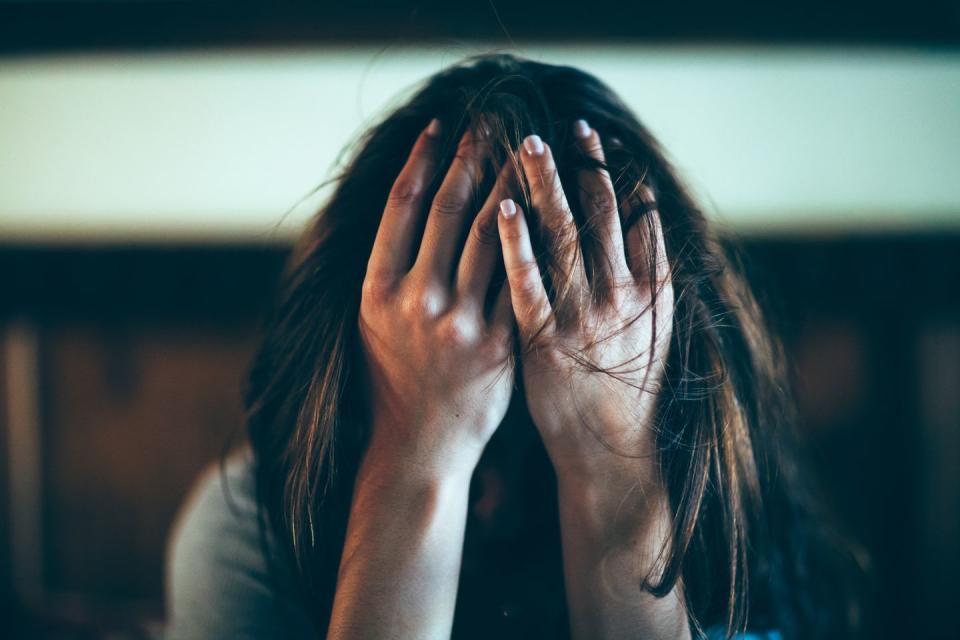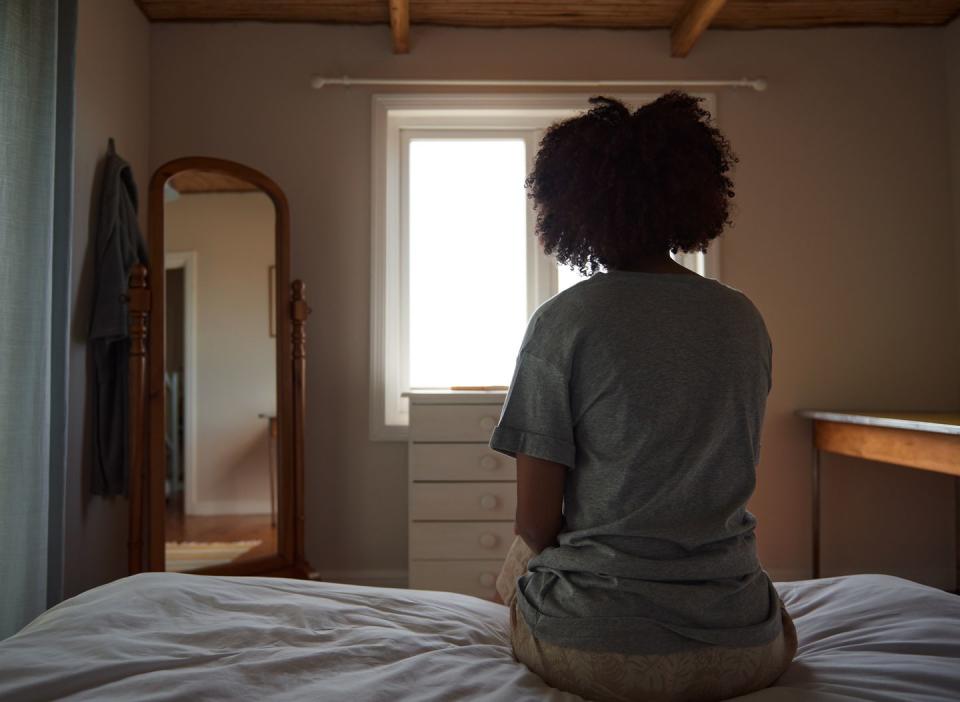What actually is sexual harassment? Here's all you need to know

Sexual harassment: a phrase that – despite it literally being the 21st century – is still being talked about. Because it's still happening. According to the 2020 Sexual Harassment Survey from the Government Equalities Office, "nearly three-quarters (72%) of the UK population experience at least one form of sexual harassment in their lifetime." While two-in-five (43%) experienced at least one sexual harassment behaviour in the last 12 months.
These numbers are high – and when coupled next to the fact that certain demographic groups have a significantly higher risk of being harassed (i.e women, young people, disabled people, ethnic minorities, and the LGBTQ+ community) – it solidifies the ugly truth that there is *still* so much work to be done to tackle sexual harassment once and for all.
There's also a bit of a knowledge gap, with some people curious as to what does and doesn't constitute as sexual harassment. Here, we've taken a deep dive into what actually is sexually harassment.
What is sexual harassment?
"In England and Wales, sexual harassment is legally defined as any unwanted sexual behaviour towards another person that makes them feel upset, scared, offended or humiliated. This includes intent, so even if the other person didn't feel these emotions, it can still be considered sexual harassment," says Saskia Lightburn-Ritchie, Chief Executive for CWA, a Cheshire-based domestic abuse charity.
Molly*, a hairdresser from Basingstoke spoke to Cosmopolitan UK about her experiences of harassment. "I've lost count of the number of times from the age of 18 to 23ish that I would get my bum grabbed on a night out. I remember a guy stuck his hand up my skirt and when I told him to f**k off he called me a 'tease,'" she recalls.
Sexual harassment can happen anywhere, adds Lightburn-Ritchie – in the workplace, schools, public spaces and online. And it can happen to anyone. "It's not limited to a specific gender harassing another. Modern technology, social media platforms and online communication channels have opened up new avenues for sexual harassment to occur."
Distance and anonymity can also fuel harassers, she outlines, making it easier for them to target people and avoid any direct consequences of their actions.

What is classed as sexual harassment?
Sexual harassment can involve "unwanted advances, requests for sexual favours, or any other verbal, non-verbal, or physical acts that intimidate or offend someone," Lightburn-Ritchie details. The Government's Sexual Harassment survey says that the three most commonly experienced behaviours - both in terms of an individual's lifetime and in the last 12 months - were unwelcome sexual jokes, staring or looks and sexual comments.
The following actions were also classed as harassment in the survey (plus the percentages in terms of lifetime frequency) include:
Unwanted messages - 28%
Provocative sounds - 30%
Offensive materials - 29%
Unwanted non-sexual touching - 33%
Personal invasion of space - 31%
Unwanted relationship attempts - 25%
Sexual assault (touching etc) - 22%
Sexually pressured exchange - 16%
Flashing - 19%
Being followed or threatened - 18%
Pictures or video shared without permission - 10%
Actual or attempted rape - 13%
Stephanie Grimshaw, Head of Public Affairs and Communications at Welsh Women's Aid adds that - as well as the above - sexual harassment can take on many other forms, and is all about how the survivor feels.
Sexual harassment in the workplace
"Any type of sexual misconduct is illegal," says Stephen Cooper, Managing Director of Stop Sexual Misconduct, a company that trains businesses, organisations, academic and medical institutions in dealing with and eradicating sexual harassment in the workplace.
"All workers, irrespective of their length of service, are protected from sexual harassment in the workplace by the Equality Act 2010," he notes, regardless of whether or not the accused party states that they meant to cause offence. (To summarise, as per the Government website, the act legally protects people from discrimination in the workplace and in wider society.)
Despite this, a recent poll from the Trade Union Congress has revealed some staggering stats, detailing that almost three in five women (58%) have experienced harassment at work. This figure increases to 62% of women aged between 25 and 34.
The 2020 Sexual Harassment survey also shared some bitter home truths, too. It disclosed that over a quarter of victims reported that their perpetrator was more senior and that women were more likely to be harassed by someone higher than them (31% compared to 26% of men). Even more alarmingly, it stated that for victims who took action, 41% said there were no consequences for their perpetrator. Plus, 50% saw their job change in some way, with the most common outcome for the victim being finding a new job (17%).
"Given its endemic nature, the responses to men's sexual harassment of women by the state and employers has often been too little too late," adds Grimshaw.
She says when women do speak out, victim blaming and shaming are rife. "Women are accused of not speaking out soon enough after the harassment has occurred, and their voices are quickly overtaken by men's experiences and the views of the establishment."

Cooper states that experiencing sexual misconduct at work can have a devastating impact on the individuals concerned, often leading to ill health and work-related stress, affecting both their work performance and personal life. This is something that especially rings true for Becky*, a bar manager from Bristol, who bravely divulged just one of her experiences from 10 years in the business.
"About six years back, I had an assistant manager who was very overly flirty with all the female staff. He would always put himself on shift with me and constantly act inappropriately, from coming up behind me and grabbing my bum, to feeling my boobs and commenting on what I was wearing. After being too scared to say anything, one shift, he followed me to the back bar and put his hands up my skirt and tried to touch me down there. Safe to say I told my manager this time, and he was swiftly fired."
"Employers have a duty of care to ensure that their employees feel appreciated, are treated with dignity and respect," and are most importantly "safe," adds Cooper.
How to combat sexual harassment
"Unfortunately, many people who experience sexual harassment are often dismissed, being told they're being unreasonable or too sensitive. But sexual harassment is never funny – it’s unacceptable and should never be trivialised," explains Lightburn-Ritchie.
Grimshaw adds that we shouldn't necessarily focus on what a victim or survivor of sexual harassment should do, either. Instead, she says "it's what society and the perpetrators should be doing or not doing."
"Anything a survivor does in any given situation is right for them. It can be incredibly difficult to report sexual harassment in a society where survivors are questioned, victim-blamed and not believed," she says.
However, "education and awareness play a crucial role in combating sexual harassment," Lightburn-Richie notes. To tackle the issue in terms of the workplace, she says that organisations must create safe environments where people can speak out without fear of retaliation. "At My CWA, we offer training to educate employers and staff on recognising red flags of unhealthy behaviours to protect their employees from harassment and abuse."
Cooper echoes this, outlining the steps Stop Sexual Misconduct takes, including awareness training and investigatory services for supervisors, HR, and team leaders.

Lightburn-Ritchie also stresses - as an employee - familiarising yourself with your rights is a non-negotiable. "If it takes place where you work, be competent in your company's policies so you can make informed choices about reporting the harassment."
As for further advice if you're facing harassment, she says prioritising your safety is the most important thing. "Call the police if you feel in immediate danger – and document everything. Seek support from people you trust or organisations that can help."
"A good first step would be visiting the Government's ENOUGH campaign website to see what support is available nationally. For example, when searching for sexual harassment support, 22 support services are listed including Victim Support Women's Aid."
And if you witness someone being sexually harassed - whether it's on a night out, at work, or just on the street - it's crucial you call out such behaviour and ensure the victim is OK if you can. (Just to be clear, never inject yourself into a situation that feels unsafe or compromising. Instead, like Lightburn-Ritchie advises, alert the authorities to deal with the matter.)
* Name has been changed
For support or more information about sexual assault, visit the Survivors Trust. For additional support with mental health, visit Mind.
You Might Also Like

